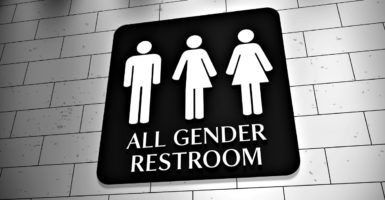Pop quiz: Which of the following sentences comes from North Carolina’s new law protecting privacy in public schools and government buildings?
1. “The provision of separate facilities or schedules for female and for male patrons, does not constitute a discriminatory practice when such separate facilities or schedules for female and for male patrons are bona fide requirements to protect personal rights of privacy.”
2. “Nothing contained in this chapter that refers to ‘sex’ shall be construed to mandate joint use of restrooms, bath houses, and dressing rooms by males and females.”
3. “Nothing in this subsection prohibits separate treatment of persons based on sex with regard to public toilets, showers, saunas and dressing rooms for persons of different sexes.”
If you guessed “none of the above,” you would be correct.
These three provisions are from statutes in Hawaii, Rhode Island, and Wisconsin, respectively.
Now let’s compare the provisions with some of the actual language from the North Carolina law, known as HB2:
Designating multiple or single occupancy bathrooms or changing facilities according to biological sex … shall not be deemed to constitute discrimination.
These four state laws are nearly identical. The laws each allow a business or public accommodation to have separate locker rooms and restrooms for men and women, rather than requiring either to give people who identify as transgender access to the facility of their choice.
At least a dozen states have similar laws. And in the remaining states, common sense was allowed to rule, resulting in a societywide consensus that businesses can (and should) maintain distinct restrooms for each of the sexes.
The same principles are enshrined in the plain language of Title IX, a federal law that opponents of these commonsense laws often cite. Actually, though, it recognizes that federally funded schools and colleges can maintain separate facilities on the basis of sex.
So why the uproar and contentious litigation over HB2, a law that does little more than follow what has been the norm across our nation (and our laws) for hundreds of years?
The same question can be asked over Mississippi’s recent conscience protection law, which ensures that individuals who work in the wedding industry cannot be compelled to create expression that violates their beliefs or personal convictions.
Existing laws provide conscience protections in other contexts, such as ensuring that a medical professional is not forced to participate in abortions.
Or consider a recently enacted law in Tennessee that allows counselors to refer a client if the client is pursuing goals that conflict with the counselor’s beliefs.
The Colorado Civil Rights Commission recognized that a baker or cake artist could not be compelled to produce a cake with a message opposing same-sex marriage, while at the same time refusing to extend the same protection to Jack Phillips, who declined to create a cake celebrating a same-sex marriage.
Mississippi’s law was a necessary response to efforts to punish those who hold the time-honored view of marriage as the union of one man and one woman. It sought to guarantee that a person’s personal convictions are not trampled in the stampede to impose same-sex marriage on our nation.
While opponents of the North Carolina and Mississippi laws aim to portray them as radical new types of laws, the truth is that both laws are modeled on similar legislation that is decades old. Yet rather than take a wait-and-see approach to see how the two laws would operate in practice, opponents rushed to court.
Why? Because that is their modus operandi. When they can’t win through the normal legislative process, they rush to court seeking a judge who would strike down the law that they were unable to defeat through the representatives of the people.
Despite no evidence of discrimination under either law, and despite no documented instances in either state of someone being denied goods or services based upon their sexual orientation or gender identity, opponents of the laws reject the will of the people and, via judicial fiat, seek to impose their own will on everyone.
We all should be troubled by what this portends for democracy. Laws with solid legal foundations and decades of precedent in other states are challenged immediately by activists as unconstitutional—a word that has been redefined to mean “a law that they disagree with.”
Indeed, the fact that activists are challenging these two laws, and not the dozens of other, similarly worded laws in both red and blue states, reveals their true colors.
These activists are not concerned with what is or is not constitutional. They are not concerned about the rule of law. They are focused on defeating their enemies, those with whom they disagree, by any means necessary.
We should all hope and pray that the courts on which these activists so heavily bank their hopes will see through the façade and rule in accordance with the law and in favor of common sense.




























